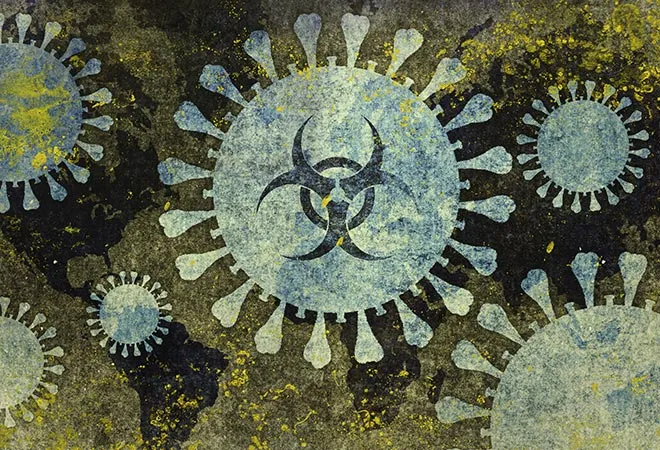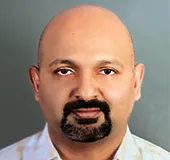-
CENTRES
Progammes & Centres
Location

A scene from Mahabharta reminds us of the situation we are in today. During the battle of Kurukshetra, Abhimanyu- the famed son of Arjun (one of the Pandavas) and the legendary warrior did not make it alive to the end. On the 13th day of the war, Abhimanyu is said to have entered the ‘chakravyuh’ which was a military formation resembling a labyrinth employed by the Kauravas. While it was comparatively easy to enter the charavyuh, as a soldier fought his way deeper into the formation, the maze engulfed him.
India, today, maybe caught in a similar situation with its response to the COVID-19 pandemic. India enforced a stringent and early lockdown to ensure that both, morbidity and mortality due to COVID 19 infection was contained and the health system was protected from being overwhelmed. However, after 21 days of implementing a lockdown the country has extended it by yet another nearly four weeks in an attempt to slow the spread of the pandemic. The question is, for how long can the lock down carry on and in what manner will it be lifted?
The lockdown has raised several other pertinent issues of migrants, job losses and an adverse economic impact all of which shook the country. While several experts, especially clinicians and epidemiologists have agreed on the necessity of such a lockdown, an appropriate way out of it seems to have met with lesser agreement. Should we extend the present lockdown to keep infections lower? For how long will it take us to develop herd immunity? Further, what about the ethical dilemmas surrounding herd immunity?
It has become clear that for a country such as India with vast income inequalities, the lockdown cannot be extended indefinitely. Various models based on clinical and epidemiological data have been put forth including a graded approach where districts are coded based on the infection rate. While clinical data is important, it should not be the only deciding factor for ending the lockdown. A more encompassing framework that would also take into account the lived reality of lakhs of poor and marginalized citizens would be the right way forward. We propose that a decision on ending or extending the lockdown and allowing restoration of business as usual should follow the four principles of bioethics which are beneficence, justice, non-maleficence and autonomy.
Beneficence would ensure each policy level action is in the best interests of the country at large. Actions taken during this period should be assessed for reducing morbidity and mortality and ensure general well-being. Attention should not shift from those already ill patients who may be impacted and as a result are unable to access the health system. The administrators need to be cognizant of this and ensure that the focussed response to COVID-19 is in balance with an appropriate strategy to ensure healthcare access to those who are suffering from other conditions. Delivery of services under various national health programmes including immunisation should be restored at the earliest.
Justice would guarantee in case the lockdown is continued, expedited efforts ensure that all sections of society especially the weak and marginalised are taken care of. Migrants stuck in transit can return home and appropriate services of transport, testing and if necessary, quarantine should be made available. Public Distribution System should be effectively utilised to provide adequate food grains and ensure that no one is left starving during this crisis. For those migrants who stay back in camps, the government should take responsibility for complete nutrition and quick transportation to their homes.
Non-maleficence would ensure that health workers and specific communities are protected from being targeted especially during these unprecedented times. Stigma and fake news should be strongly dealt with using the existing legal framework and addressed proactively through clear communication and messaging. While the state has been trying to expand the testing and treatment facilities, it is necessary that private and corporate health providers play their part by ensuring that their facilities are optimally available to all irrespective of economic abilities.
Now is the best time to follow India’s motto of unity in diversity. While the centre leads the way by laying out a policy framework, it should empower the states and in fact even the districts to take decisions that are in the best interests of the local communities. The principle of autonomy would demand for decentralised decision making based on the evolving situation of the pandemic. Devolving of power till district level and capacity building of health staff is important.
While the chakravuyh was a brilliant military formation, the Mahabharata tells us that there were others who possessed the ability to break out of it. Arjuna is said to have possessed all the divyastras or divine weapons that gave him the ability to break out of this labyrinth with ease. The four principles of bioethics provide us was with measures similar to the divyastras that Arjuna possessed. It’s time now that our leaders and policymakers make effective use of these to break free from the chakravyuh that covid19 has created for us.
The views expressed above belong to the author(s). ORF research and analyses now available on Telegram! Click here to access our curated content — blogs, longforms and interviews.

Madhavi Misra is a public health implementer and researcher with over a decade of experience working closely with the India Public Health System.
Read More +
Mathew Sunil George is a public health academic He has worked in India and East and South Africa over the last fifteen years on studying ...
Read More +